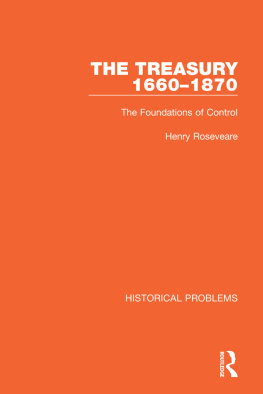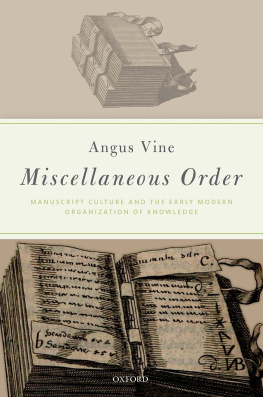HISTORICAL PROBLEMS
Volume 8
THE TREASURY 16601870
First published in 1973 by George Allen & Unwin Ltd
This edition first published in 2021
by Routledge
2 Park Square, Milton Park, Abingdon, Oxon OX14 4RN
and by Routledge
52 Vanderbilt Avenue, New York, NY 10017
Routledge is an imprint of the Taylor & Francis Group, an informa business
1973 George Allen & Unwin Ltd
All rights reserved. No part of this book may be reprinted or reproduced or utilised in any form or by any electronic, mechanical, or other means, now known or hereafter invented, including photocopying and recording, or in any information storage or retrieval system, without permission in writing from the publishers.
Trademark notice: Product or corporate names may be trademarks or registered trademarks, and are used only for identification and explanation without intent to infringe.
British Library Cataloguing in Publication Data
A catalogue record for this book is available from the British Library
ISBN: 978-1-03-203925-1 (Set)
ISBN: 978-1-00-319296-1 (Set) (ebk)
ISBN: 978-1-03-203809-4 (Volume 8) (hbk)
ISBN: 978-1-03-203816-2 (Volume 8) (pbk)
ISBN: 978-1-00-318917-6 (Volume 8) (ebk)
Publishers Note
The publisher has gone to great lengths to ensure the quality of this reprint but points out that some imperfections in the original copies may be apparent.
Disclaimer
The publisher has made every effort to trace copyright holders and would welcome correspondence from those they have been unable to trace.
THE TREASURY 16601870
The Foundations of Control
Henry Roseveare
Kings College, London
LONDON: GEORGE ALLEN & UNWIN LTD
NEW YORK: BARNES AND NOBLE BOOKS
(A division of Harper & Row Publishers, Inc.)
First published in 1973
This book is copyright under the Berne Convention. All rights are reserved. Apart from any fair dealing for the purpose of private study, research, criticism or review, as permitted under the Copyright Act, 1956, no part of this publication may be reproduced, stored in a retrieval system, or transmitted, in any form or by any means, electronic, electrical, chemical, mechanical, optical, photocopying, recording or otherwise, without the prior permission of the copyright owner. Enquiries should be addressed to the publishers.
George Allen & Unwin Ltd 1973
Published in the USA 1973 by Harper & Row Publishers, Inc.
Barnes and Noble Import Division
BRITISH ISBN 0 04 942114 x hardback
0 04 942115 8 paperback
AMERICAN ISBN 06-495984-8
Printed in Great Britain
in 10 point Plantin type
by The Aldine Press, Letchworth
The reader and the teacher of history might be forgiven for thinking that there are now too many series of historical documents in existence, all claiming to offer light on particular problems and all able to fulfil their claims. At any rate, the general editor of yet another series feels obliged to explain why he is helping one more collection of such volumes into existence.
One purpose of this series is to put at the disposal of the student original materials illustrating historical problems, but this is no longer anything out of the way. A little less usual is the decision to admit every sort of historical question: there are no barriers of time or place or theme. However, what really distinguishes this enterprise is the fact that it combines generous collections of documents with introductory essays long enough to explore the theme widely and deeply. In the doctrine of educationalists, it is the original documents that should be given to the student; in the experience of teachers, documents thrown naked before the untrained mind turn from pearls to paste. The study of history cannot be confined either to the learning up of results without a consideration of the foundations, or to a review of those foundations without the assistance of the expert mind. The task of teaching involves explanation and instruction, and these volumes recognize this possibly unfashionable fact. Beyond that, they enable the writers to say new and important things about their subject matter: to write history of an exploratory kind, which is the only important historical writing there is.
As a result, each volume will be a historical monograph worth the attention which all such monographs deserve, and each volume will stand on its own. While the format of the series is uniform, the contents will vary according to need. Some problems require the reconsideration which makes the known enlighteningly new; others need the attention of original research; yet others will have to enter controversy because the prevailing notions on many historical questions are demonstrably wrong. The authors of this series are free to treat their subject in whatever manner it seems to them to require. They will present some of their evidence for inspection and help the learner to see how history is written, but they will themselves also write history.
G.R.E.
For Iris
The terminal dates of this study require some explanation. They have not been chosen arbitrarily, or for convenience: a shorter period could have been more comfortably handled. Rather, 1660 and 1870 impose themselves, marking out boundaries for any study which seeks to examine the Treasurys early evolution.). While there is always something artificial about the historians demarcation of boundaries, I hope to show that there can be no mistaking the reality of these.
For reasons which will become apparent in Section 3, the same dates provided the obvious limits for the Institute of Historical Researchs recent publication, Officeholders in Modern Britain: Treasury Officials, 16601870, ed. J. C. Sainty.
However, the reader can judge this for himself. At several points in the Introduction I shall argue that some valuable interpretations of the Treasurys history have been flawed by narrow or incorrect perspectives, suggesting uniqueness or special importance in developments which take on a quite different significance when seen in the larger context. The object of this book is to provide that context and some of the documentation on which an opinion can be formed.
Likewise, the reader must judge whether the aspects I have chosen to discuss are the really important ones. Here again, although selection was essential in a book of this scale, it is not solely convenience which has determined the choice. I have tried to define something about the nature of Treasury control which is more important than the superficial characteristics of its day-to-day enforcement. My theme is, rather, the creation of the administrative, political and constitutional base from which such enforcement could begin. Part of this foundation was certainly composed of immemorial powers antedating the 1660s, and the significance of the late-seventeenth-century Treasury (discussed in Section One) lies precisely in the way in which traditional authority was consolidated with such vigour, consistency and originality that it was never again in danger of eclipse. But effective Treasury control really needed effective parliamentary control for its logical completion, and for this reason crucial stages in the evolution of the Treasurys authority are closely linked to the steps by which the House of Commons made itself competent to control public expenditure. This is a theme to be traced through parliamentary inquiries, debates and legislation as much as through Treasury minutes, and it is as much concerned with the Exchequer and its anomalies as with the senior institution which so strikingly failed to reform it. Section Two, therefore, carries an account of this problem past the abolition of the Exchequer in 1834 to the sequence of mid-nineteenth-century reforms which left the Treasury under a heavy but healthy responsibility to the watchdogs of the House of Commons.





